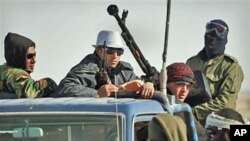An independent analysis of the fluid military situation in Libya says the rebels are poorly organized, but have high morale as they face better-armed troops loyal to Libyan leader Colonel Moammar Gadhafi. Analysts believe the ingredients are there for a prolonged stalemate.
A report by the London-based International Institute for Strategic Studies says Libyan rebels have the will, but lack the means to take Tripoli, even though Gadhafi loyalists are unable to strike the decisive blow against the rebels.
Analyst Gary Li of the Institute’s Defense and Military Analysis Program says the two sides are almost mirror images of each other.
"While the government has the preponderance in hardware, they lack the morale to carry out any major attacks, as we are seeing in the multiple repulsions of their attacks on the towns around Tripoli," said Gary Li. "And the reverse is true for the rebel forces - while they have high morale, they lack the equipment necessary to take on a heavily urbanized and heavily defended urban center such as Tripoli. So I think the threat is definitely there that if both sides reach a stalemate that it might stay like that for weeks, if not months."
Drawing from satellite imagery and other sources, the institute concludes the rebels have primarily small arms, such as rocket-propelled grenade launchers and anti-aircraft guns ferried around in pickup trucks. Li says the rebels lack organization and experience.
"At the present time, I would say that the vast majority of rebel forces that have been deployed in what is commonly referred to as ‘Free Libya’ can be described as 'ragtag.' They do not really have much of an organizational structure, they are not trained soldiers, and the majority of them are little more than enthusiastic volunteers who have never really fired a gun in their lives, until the rebellion," he said.
But, he adds, soldiers who have defected from the government are slowly organizing the rebels and training them in weapons use, particularly against tanks.
Government armor is a major threat to the rebels, the institute says, as is airpower. Li says the weaponry on the government side is old and the soldiers have basic skills, but they are still effective.
"Training is probably quite poor by Western standards, but probably good enough for Gadhafi’s needs," said Li. "The primary factor in the units, the most important factor, is the loyalty to the regime and the respective commanders, which are Gadhafi’s sons, Gadhafi's various sons. In terms of the equipment, they do have the crème de la crème of the military hardware, but, again, that is not really saying much."
Gary Li says the rebels will find it hard to take Tripoli without a corresponding internal uprising in the capital.
"The main chance of a rebel success lies in the population of Tripoli itself," he said. "It is very, very difficult even if the rebels are organized to take Tripoli and wrest control from Gadhafi’s hands if there was not simultaneously a civil revolt within the city. And Gadhafi is highly aware of this. Some of his best units are deployed within the city, and he is very, very reluctant to send any of them out to take part in offensives in the surrounding towns. So this is a sign of how paranoid he is, and just how much resistance there is to the regime even now in the city of Tripoli."
The institute says at least some of government units’ morale is low and their loyalty suspect. The International Institute for Strategic Studies report says there have been reports of aircraft dropping their bombs miles away from their targets.
Analysts: Libya Faces Possible Military Stalemate
- By Gary Thomas












